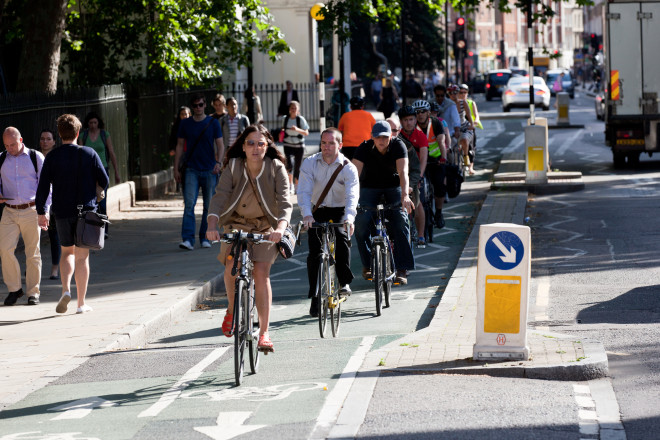
Funding the future of transport: congestion charges in cities used to promote cycling
At the International Transport Forum’s annual summit this week, German transport minister Peter Ramsauer said we need to find additional sources in order to finance the future of transport, as public budgets are being cut in many places. Investing in cycling, the most cost-effective and environmentally friendly way of getting from A to B, therefore seems like a good idea.
But even if cycling is cheap compared to other modes of transport, the question remains: where to get the money from, as little as it may be? Charging for congestion or parking space in city centers is a solution that allows easing congestion and funding new infrastructure at the same time.
Londoners have a good idea how it works since a congestion charging zone was introduced around the city center in 2003. Entering Central London from Monday to Friday between 7am and 5pm now sets motorists back £10. Enough, it seems, for many of them to switch to their bicycle. By 2011, cycle traffic had risen by 70 percent in comparison to 10 years earlier, and cycling promotion has nowadays become a flagship project of the city’s administration.
“If the city makes sure that congestion and parking charges are used in order to promote cycling, that’s a win-win situation. You get less traffic and reduce congestion while infrastructure is being improved, and all without straining existing budgets,” says Fabian Küster, Senior ECF Policy Analyst.
This week ECF is addressing the 53 OECD transport ministers during the International Transport Forum in Leipzig. This year’s theme is funding transport. This article is the first of a series that aims at showing how bicycle users can-and already do-help solving the tight budgets equations.
In Antwerp, Belgium’s second-largest city, inner city parking fees are reinvested into sustainable mobility projects and the city’s bicycle sharing scheme. Thus, the operator of the parking spaces has been able to fund the city’s bike sharing system with €27 million over 10 years. Its efforts earned Antwerp a respectable 5th rank on the renowned Copenhagenize index of cycling-friendly cities for the first time this year.
“Not only does charging for congestion help solve traffic problems, we also see that the revenue is often reinvested into cycling,”concludes Fabian Küster. “This is what ECF has been promoting for a long time. Cycling is just a natural choice in order to replace car traffic in urban areas, and it works.”
Encouraged by the positive examples from London and Antwerp, the Italian City of Milan introduced a congestion charge in the city centre in 2012. Car usage in this zone dropped by 31 % in 2012 compared to 2011. This means that in only one year, 41.000 vehicles are no longer entering the city centre on a daily basis. €13 million of the €20 million in revenues is being re-invested into improving public transportation and extending the bike-sharing scheme BikeMI into the suburbs.
After all, if Peter Ramsauer takes his next trip to Milan, London, or just across the border to Antwerp, he might as well discover how the future of transport can be funded.
About the Author
 Fabian Küster is a Senior Policy Officer at the European Cyclists’ Federation. He has previously worked in Brussels for a German Member of European Parliament and the German Embassy. He has wealth of experience in and around the EU institutions, and is an expert in the EU policy field of bicycles
Fabian Küster is a Senior Policy Officer at the European Cyclists’ Federation. He has previously worked in Brussels for a German Member of European Parliament and the German Embassy. He has wealth of experience in and around the EU institutions, and is an expert in the EU policy field of bicycles
- Log in to post comments
Contact the author
Recent news!
Upcoming events
Contact Us
Avenue des Arts, 7-8
Postal address: Rue de la Charité, 22
1210 Brussels, Belgium










